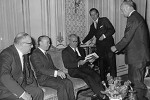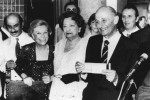2021 (EN)
|
14 January 2021
Tutte le Attività (EN) -
Anno 2021
 Great influx of links and contacts on the multimedia platform of the Museum of Peace - MAMT for the centenary of the birth of Mario Pomilio.
Great influx of links and contacts on the multimedia platform of the Museum of Peace - MAMT for the centenary of the birth of Mario Pomilio.
The president Michele Capasso, in connection, collected various testimonies and recalled the friendship between the writer and his paternal uncle Celestino Capasso.
Writer and essayist Mario Pomilio (who died in 1990) wrote famous works such as "La compromissione" (winner of the Campiello Prize in 1965), "Il quinto evangelio" and "Il Natale del 1833", in which he plumbs the spiritual travail of Alessandro Manzoni ( Strega Award in 1983)."He approached religious reflection in the course of his life. His Christianity was very much filtered by the Enlightenment and by reason", his daughter Annalisa told of him in an interview with "Famiglia Cristiana" in 2015 which we propose here.
A clear, vivid image resurfaces from the ocean of memories. "It's 1983: we are at the seaside in Baia Domizia, in my parents' house", says Annalisa Pomilio. "We are sitting in front of a small black and white television to watch the Strega Award ceremony live." That year, in fact, the jury crowned Mario Pomilio, his father, author of Il Natale del 1833. A novel of strong impact, challenging from the thematic point of view, a challenge from a stylistic point of view: following the Manzoni form of the mixed composition of real documents and invention, historical reconstruction and fiction, Pomilio plumbs the human and spiritual travail of Alessandro Manzoni starting from Il Natale del 1833, a fragment of an interrupted poem resulting from the pain of the death of his first wife, Enrichetta Blondel. The writer's anger at God, the outburst of a Christian man who, in the face of suffering, does not deny his faith but wonders why God can allow evil in the world. A reflection particularly dear to Pomilio.
«Dad came from a particular family», Annalisa recalls, «his mother was an extremely religious woman, his father was a socialist, atheist. Dad absorbed both souls of his parents into his personality. In his youth he was far from Christian themes. He then approached faith and religious reflection over the years and over his life. Surely his Christianity was very much filtered by the Enlightenment and by reason, he was a faith with a strong rational component, just like Alessandro Manzoni's faith was. Dad deeply felt the theme of human suffering as his own: it is emblematic that he wrote Christmas of 1833 when for some years he had been fighting against a very painful disease, rheumatoid arthritis, which caused him enormous suffering and at a certain point did not allow him more than writing. Christmas was born in a period of remission of the disease, in which arthritis had granted him a little peace".
Originally from Orsogna, in the province of Chieti, writer, man of letters, scholar, teacher of literature first in high schools, then at the Naples Conservatory and at the University, in 1949 Pomilio moved to Naples, where he spent the rest of his life and where he died in 1990, at the age of 69. From the marriage with Dora Caiola, also from Abruzzo, Annalisa was born in 1956, two years after Tommaso, who now lives in Rome. In 1979, at the age of 23, fresh from a degree in Literature, Annalisa left Naples for Turin. The idea was to stay for a short time, accumulate points as a teacher with substitutes in schools and go home. "I haven't left anymore." In Naples, however, he returned every summer, for long periods, with the whole family.
“My father was an open and liberal spirit for his day. I remember a sentence from him: "For women there is no freedom if they do not pass through economic independence". In fact, he had insisted that my mother, who came from a very traditional family, work as a teacher ». Of the writer Pomilio, Annalisa remembers the very particular way of working: "During the day she taught, in the afternoon she rested for a while, then she went out and took long walks across the Vomero, where we lived. He carried notebooks with him, occasionally took them out to jot down phrases, thoughts, reflections. It was useless to go with him, it would have been like walking alone. In the late afternoon he would go to work at his desk and go on writing until late at night ».
He wrote everything by hand, Pomilio, he never wanted to convert to a computer. «His was an artisanal, Carthusian job: he made a first draft by hand, went over everything by machine, then corrected the proofs and retorted them again. He produced a series of huge folders that are now found at the University of Pavia, in the Manuscripts Center, where a pool of talented researchers is studying this amount of papers and documents ". Of the literary productions of him, the writer did not speak to the family. “He was very reserved at home about his work. He confided a lot in Michele Prisco, a Neapolitan writer and his brotherly friend. In the family, however, he tended to direct our reading a lot. For example, he was a fierce opponent of comics, because he claimed that they become unaccustomed to reading. On the other hand, at the age of 12 he made me read Flaubert's Madame Bovary, telling me that in this way I would not fall victim to the stupid romance novels ".
Today, Annalisa especially misses the smile of her father. "Through his works, all very different from each other, but all very demanding for the issues addressed, he appears as a severe author. Instead he was a very smiling man, who knew how to give a lot of attention. My mother was the carabiniere of the house, a stern, strong woman. Dad was very sweet. In the rebellious and contesting years of our adolescence, he had the function of the mediator, who tried to fix things and make peace ».
And then the memory of the walks with him on Sunday morning: «He took Tommaso and me and took us to the park. I remember the long walks in the Capodimonte park, the games on what my brother and I called “ilpratonostro”. I remember the film clubs he took us to ». And the events experienced, understood through the paternal eyes. Il Sessantotto, for example: «He looked interested at the images on the news of student protests. I was a child, I did not have the tools to understand, but I perceived his interest, his emotional participation, I grasped the importance of what was happening. Well, I got to know many things in the world in this way: through my father's eyes ».










